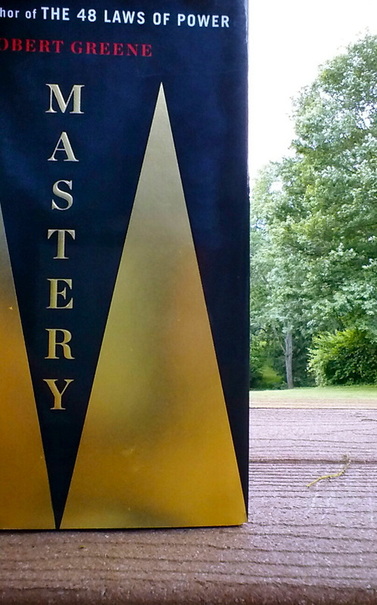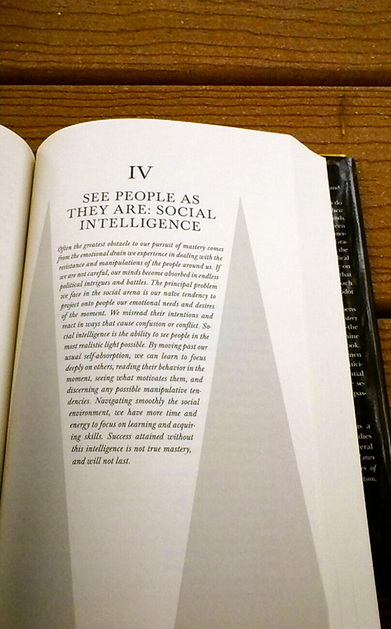I first picked up Robert Greene's Mastery in November 2012, just a few months after I moved 3,000 miles away from my hometown to southern California for my first real-world job. I had heard about Greene via Ryan Holiday's blog, and then became extremely interested after seeing him on Chase Jarvis Live. I honestly don't know where I would be if I didn't take the next step and read his book. It was a very exciting - and frustrating time for me. I was extremely dissatisfied with certain things going on at work, some involving me and some orbiting around me. But more importantly I wasn't writing fiction regularly. Yes, some of that was stress from work, which made it difficult to switch gears once I came home in the evenings, but some of it was because of my own apprehension toward beginning a new project - and then to compound it - a certain sense of guilt I felt about wasting time. Mastery was a call for me to recommit to writing - by helping me to recall what I wanted most. It was precisely the first step to Mastery that struck home.
Regardless of particular fields, Greene contends that most Masters and creatives discover their "Life's Task" in childhood or adolescence. Whether it was Da Vinci's fascination with flight and nature, Marie Curie's interest in her father's chemistry instruments, Mozart's desire to impress his musically inclined father, or Yoky Matsuoka's love for math and human anatomy, the ideas that take root in us early in life, often affect the direction we grow towards the most.
Regardless of particular fields, Greene contends that most Masters and creatives discover their "Life's Task" in childhood or adolescence. Whether it was Da Vinci's fascination with flight and nature, Marie Curie's interest in her father's chemistry instruments, Mozart's desire to impress his musically inclined father, or Yoky Matsuoka's love for math and human anatomy, the ideas that take root in us early in life, often affect the direction we grow towards the most.
2. Occupy the Perfect Niche - The Darwinian Strategy:
- Johann Wolfgang Von Goethe
Here are Green's strategies for finding or returning to your Life's Task:
In order to master a field, you must love the subject and feel a profound connection to it...These childhood attractions are hard to put into words and are more sensations- that of deep wonder, sensual pleasure, power, and heightened awareness. The importance of recognizing these preverbal inclinations is that they are clear indications of an attraction that is not infected by the desires of people...they can only be your own, reflections of your unique chemistry.
You possess a kind of inner force that seeks to guide you toward your Life's Task - what you are meant to accomplish in the time that you have to live. In childhood this force was clear to you. It directed you toward activities and subjects that fit your natural inclinations, that sparked a curiosity that was deep and primal. In the intervening years, the force tends to fade in and out as you listen more to parents and peers, to the daily anxieties that wear away at you. Daily anxieties? Hell yes, they were wearing away at me. In Greene's own words: |
1. Return To Your Origins - The Primal Inclination Strategy:
The misery that oppresses you lies not in your profession but in yourself! What man in the world would not find his situation intolerable if he chooses a craft, an art, indeed any form of life, without experiencing an inner calling?...Everything on this earth had its difficult sides! Only some inner drive-pleasure, love-can help us overcome obstacles, prepare a path, and lift us out of the narrow circle in which other tread out their anguished, miserable existences!
But I found this quote from Goethe a few pages later extremely helpful in keeping my present woes in perspective. In fact, I printed out a copy of the quote and taped it to the wall above my writing desk for a while. I won't say there weren't days after that I skipped out on, but by in large, just the physical reminder helped me brave the blank page:
The career world is like an ecological system: People occupy particular fields within which they must compete for resources and survival. The more people there are crowded into a space, the harder it becomes to thrive there. Working in such a field will tend to wear you out as you struggle to get attention, to play the political games...The game you want to play is different: to instead find a niche in the ecology that you can dominate. It is never a simple process to find such a niche. It requires patience and a particular strategy. In the beginning you choose a field that roughly corresponds to your interests. From there you can go in one of two directions:...a narrower field...or create a new field.
3. Avoid the False Path - The Rebellion Strategy:
Actively rebel against those forces that have pushed you away from your true path. Scoff at the need for attention and approval - they will lead you astray. Feel some anger and resentment at the parental forces that want to foist upon you an alien vocation. It is a healthy part of your development to follow a path independent of your parents and to establish you own identity.
4. Let Go of the Past - The Adaptation Strategy:
In dealing with your career and its inevitable changes, you must think in the following way: You are not tied to a particular position: your loyalty is not to a career or a company. You are committed to your Life's Task, to giving it full expression. It is up to you to find it and guide it correctly...Change is inevitable, particularly in such a revolutionary moment as ours....You must adapt your LIfe's Task to these circumstances.
5. Find Your Way Back - The Life or Death Strategy
Most often, you deviate {from your Life's Task} because of the lure of money, of more immediate prospects of prosperity. Because this does not comply with something deep within you, your interest will lag and eventually the money will not come so easily...You must listen to the message of this frustration, this pain and let it guide you...Make your return to the path {to your Life's Task} a resolution you set for yourself, and then tell others about it.
Greene goes on to write that not finding your Life's Task
...can be the source of your unhappiness - your lack of connection to who are and what makes you unique. The first move toward mastery is always inward - learning who you really are and reconnecting with that innate force. Knowing it with clarity, you will find your way to the proper career path and everything else will fall into place. It is never too late to start this process.
| And it's never wrong to remind yourself of it either. Since first reading Mastery, I've consulted it often, taking notes two separate times. The richness I find in the historical examples that color the theory is both inspirational and instructional. I can't recommend it highly enough. { * } Robert Greene's other works include The 48 Laws of Power, The 33 Strategies of War, The Art of Seduction, and The 50th Law. I've read 48 Laws and found it both disturbing and insightful. You can read my thoughts on it here. I just purchased The 33 Strategies of War after hearing that it was Ryan Holiday's favorite. Greene's blog is here, though lately it hasn't been the most active. Let me know where you land with Mastery and/or these others by him. Happy reading! |




















